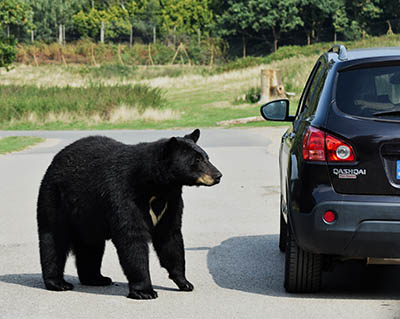What To Do If You See a Bear
To some, seeing a black bear can be a thrilling experience, but to others, it can be a bit unnerving. Having black bears around is not an immediate threat, and like all wild animals, black bears should be treated with respect and given space. It is not uncommon to see black bears in the central part of the state (Baltimore County, Harford County, Montgomery County, etc.) due to seasonal movement.
 To Report Bear Related Emergencies Call 1-410-260-8888
To Report Bear Related Emergencies Call 1-410-260-8888
Black Bear Behavior:
- Most bears fear people and will leave when they see you.
- If a bear woofs, snaps its jaws, slaps the ground or brush, or bluff charges: YOU ARE TOO CLOSE!
- Some bears will often stand upright to obtain a better sense of smell. This is not an aggressive posture.
If You See a Bear:
- Don’t panic. Don’t shoot! Don’t approach. Don’t feed!
- Make the bear aware of your presence by talking in a firm voice
- Ensure the bear has an escape route, so give it space, and keep domestic animals away.
- Back away slowly with your arms raised up to appear large.
- Have all people and pets go inside to wait for the bear to leave.
- If you would like to report a sighting, please contact your local wildlife office. (See list at the bottom
of this page).
- Learn to tolerate bears. Many bears are killed or injured when not causing problems.
Remember to NEVER INTENTIONALLY FEED bears.
It’s illegal in Maryland, and it is dangerous for you and the bear.
If a Bear Refuses to Leave:
- Be sure you have allowed the bear an escape route.
- Be sure pets are taken indoors or away from the bear.
- Make loud noises to scare it away.
- Call your local wildlife office for direction. (See list at the bottom of this page).
If a Bear is Treed:
- LEAVE IT ALONE! The bear will usually go away when it feels safe.
- Have people leave the area.
- Remove your dog from the area.
Spray repellents containing capsaicin (hot pepper liquid) are available to discourage bold bears. These repellents are effective and will not permanently damage the bear’s eyes or make the bear aggressive. It is rare when a bear cannot be chased away. Remember to leave a clear escape route for the bear.
Strategies for Minimizing Bear/Human Conflicts
Bears can easily become used to human activities. This occurs especially when bears learn to associate people with food. Unfortunately, this can lead to a bear losing its natural fear of people. Bears are intelligent, opportunistic feeders. They will return to places where they have found an easy meal. Human-habituated bears can create situations that are dangerous for both humans and bears.
The DNR-Wildlife & Heritage Service has implemented several strategies to meet the demand of Maryland’s growing black bear population.
- A wildlife response team is on call 24 hours a day, seven days a week to respond to emergencies. DNR staff also provides aversive conditioning.
- A comprehensive outreach and education plan is in effect to educate Marylanders and visitors about living with black bears.
- The Black Bear Damage Reimbursement Fund compensates landowners who have suffered agricultural damage as a result of black bears.
- Wildlife & Heritage Service staff provide technical assistance to landowners who are experiencing bear problems.
- Wildlife & Heritage Service will provide electric fencing and technical support for beekeepers experiencing problems with bears around beehives. (Black Bears & Beekeeping)
Additional Information: